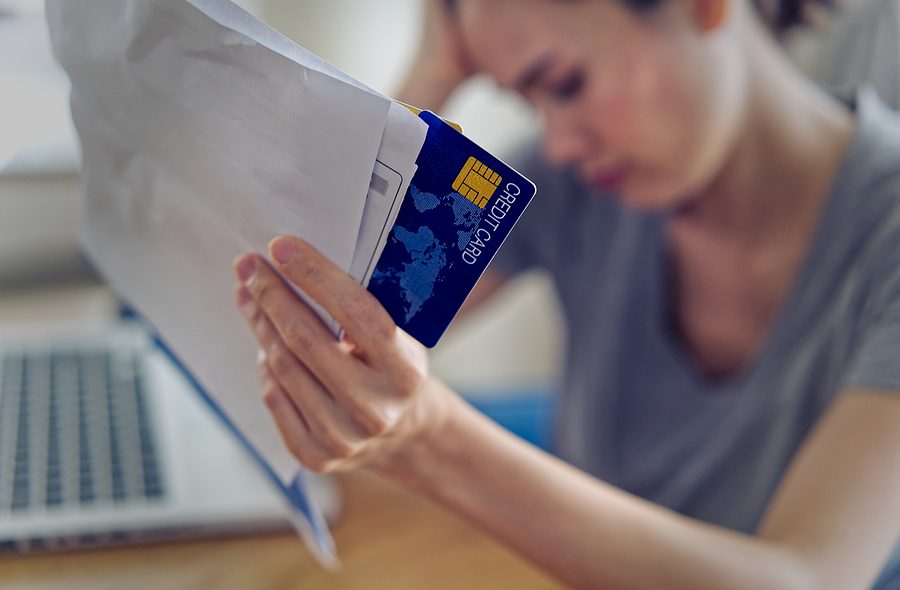When someone is entering retirement, the last thing that person wants to deal with is mounds of credit card debt. For the most part, retirees are living on a fixed or limited income, which means they have very few financial resources to pay off any lingering debt they may be carrying.
A fixed income also means there is little ability to handle any unexpected financial crises, which can include a costly home repair or medical expense. In the event the unexpected happens, some retirees are forced to rely on credit cards or personal loans to cover the costs. The interest on a personal loan or a single missed credit card payment, can cause the debt to spiral out of control quickly.
Here are some debt payoff tips for seniors struggling with credit card debt.
Refinance your debt.
One possible way to pay off a large amount of credit card debt is through refinancing or consolidation of the credit card debt. This payment could be made through a home equity line of credit (HELOC) if you own your home and hold a good amount of equity in it. A HELOC carries a lower interest rate than other methods of consolidating or refinancing debt since it is attached to collateral and is a secured loan.
Credit card debt can also be paid by consolidating all cards into one card through a balance transfer. By doing a transfer, the cardholder can attack one, larger debt, rather than pay minimum payments on multiple cards every month. However, these transfers normally come with a promotional period which means the cardholder can only benefit from the zero or low interest rate for a set period. After that time period expires, the cardholder will soon find his or her rates increase significantly.
Examine your budget.
Paying off your credit card debt can be nearly impossible, if you do not establish a set budget. By putting together a list of necessary expenses and reviewing what purchasing habits put you into debt, you cannot cut unnecessary expenses and free up money to go towards your credit card debt. It is also recommended that you avoid using your credit cards during this time period when you are working on paying off outstanding balances.
Target the card with the highest interest rate.
If debt consolidation is not a possibility and you are struggling to pay multiple credit cards, one method that is recommended is to focus on paying one card at a time. This method does take time and patience, but it can be successful. Look at what credit cards you have and list what interest rate is on each card. Take the card that has the highest interest rate and throw whatever extra money you may have towards that card first, while continuing the minimum monthly payments on the other cards. Once that card is paid, then focus on the credit card with the next highest interest rate and so on, until all cards are paid in full.
Work a part-time job.
Retirement does not always mean that you will never hold another job. In fact, many retired individuals choose to take a part-time job not only to earn some extra money, but to socialize and be out with people. Many retirees find a great deal of success in part-time consulting or freelance work after retiring from a long-term professional career.
For seniors struggling with insurmountable debt, help is here. Do spend your golden years being hounded by creditors. Credit card debt is one of the most common problems we see facing those with serious financial issues. The stress can become compounded with collection calls and the threat of lawsuits. Bankruptcy not only gives people a financial fresh start, but it is a powerful tool that can be used to protect valuable assets, including property, vehicles and retirement savings.
If you have questions on this topic or are in financial crisis and considering filing for bankruptcy, contact an experienced Miami bankruptcy attorney who can advise you of all of your options. As an experienced CPA as well as a proven bankruptcy lawyer, Timothy Kingcade knows how to help clients take full advantage of the bankruptcy laws to protect their assets and get successful results. Since 1996 Kingcade Garcia McMaken has been helping people from all walks of life build a better tomorrow. Our attorneys’ help thousands of people every year take advantage of their rights under bankruptcy protection to restart, rebuild and recover. The day you hire our firm, we will contact your creditors to stop the harassment. You can also find useful consumer information on the Kingcade Garcia McMaken website at www.miamibankruptcy.com.
Source: https://www.theladders.com/career-advice/5-ways-retirees-can-tackle-their-credit-card-debt



